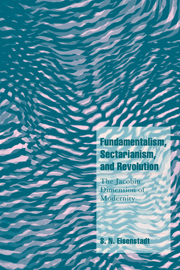Book contents
- Frontmatter
- Contents
- Preface
- 1 Heterodoxies, sectarianism, and utopianism in the constitution of proto-fundamentalist movements
- 2 The Great Revolutions and the transformation of sectarian utopianism in the cultural and political program of modernity
- 3 Fundamentalism as a modern Jacobin anti-modern utopia and heterodoxy – the totalistic reconstruction of tradition
- 4 Historical setting and variability of fundamentalist movements
- 5 Some considerations on modernity
- Notes
- Select bibliography
- Index
3 - Fundamentalism as a modern Jacobin anti-modern utopia and heterodoxy – the totalistic reconstruction of tradition
Published online by Cambridge University Press: 30 September 2009
- Frontmatter
- Contents
- Preface
- 1 Heterodoxies, sectarianism, and utopianism in the constitution of proto-fundamentalist movements
- 2 The Great Revolutions and the transformation of sectarian utopianism in the cultural and political program of modernity
- 3 Fundamentalism as a modern Jacobin anti-modern utopia and heterodoxy – the totalistic reconstruction of tradition
- 4 Historical setting and variability of fundamentalist movements
- 5 Some considerations on modernity
- Notes
- Select bibliography
- Index
Summary
Introduction: the historical settings
Modern fundamentalist movements constitute one of the major social movements which developed in the framework of modern civilization and of modernity. The ideologies promulgated by the fundamentalist movements constitute a part of the continually changing discourse of modernity, especially as it developed from the end of the nineteenth century onwards. These movements continually interacted with other such movements often constituting mutual reference points to one another. These fundamentalist movements developed in a specific historic context (as did other social movements), one characterized by both a new historical phase which crystallized in the second half of the twentieth century in the confrontations between the Western European and Non-Western civilizations, and by the intensification within the Western countries of discourse concerning the internal antinomies of the cultural program of modernity – particularly those regarding the different conceptions of reason and rationality (as we shall see in greater detail in chapter 4).
Within the broad panorama of the multiple modern movements and discourses of modernity, the fundamentalist movements developed some particular characteristics that rendered them potentially one of the most extreme, yet distinctively Jacobin forms of social movements. These characteristics, which distinguish these movements from the proto-fundamentalist ones, existed in embryonic form in most of them and came to full fruition under specific historical conditions in the more “visible” and active movements.
- Type
- Chapter
- Information
- Fundamentalism, Sectarianism, and RevolutionThe Jacobin Dimension of Modernity, pp. 82 - 118Publisher: Cambridge University PressPrint publication year: 2000



